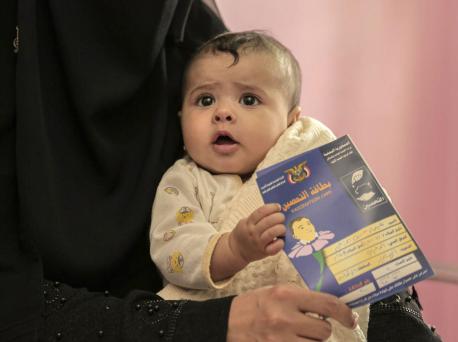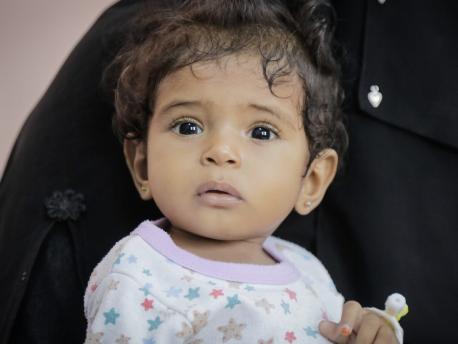
Rohingya Refugees Face a Perilous Future
Outcast and Desperate: In a new report, UNICEF warns that the hundreds of thousands of children who have fled Myanmar for Bangladesh face a 'perilous future', and issues an urgent call for greater support for relief efforts.
They live in flimsy bamboo shelters in a vast, congested and chaotic encampment.
A sheet of thin plastic is their only protection from the fierce sun.
The monsoon rains turn the floor they sleep on — and the entire camp — to thick mud.
Their days are spent fetching water — much of it contaminated — or waiting in lines for a handout of rice and biscuits.
Disease, violence and the threat of exploitation and trafficking are an ever-present danger.
Their hopes for an education are vanishing — and with them their chances to fulfill their potential...
So reads a newly-released report from UNICEF entitled, Outcast and Desperate: Rohingya refugee children face a perilous future. The report details the deepening crisis that is unfolding in southeast Bangladesh: an influx of some 600,000 Rohingya, fleeing horrific violence in neighboring Myanmar.

Many Rohingya refugees are children who have been separated from their families during their journey from Myanmar into Bangladesh. © UNICEF/UN0136202/LeMoyne
These refugees join the hundreds of thousands of Rohingya who came before them, some also driven out by violence, others by severe flooding. During the second week of October, another surge brought 2,000 to 3,000 new arrivals each day.
More than half of the refugees are children, many of them separated from their parents. Among them are Formina, 16, her sister Sadiya, 8, and brother Mohammed, 7. The siblings saw their father killed in Myanmar, then lost track of their mother in the panic that ensued. They arrived in Bangladesh accompanied by their ailing grandmother, Jamila. "Every day I worry about the children," Jamila says. "How can I feed them, how can I keep them safe?"

Overcrowded and unsanitary conditions and a shortage of food, clean water and other basic necessities are increasing the risk of disease in the refugee camps and makeshift settlements. © UNICEF/UN0136203/LeMoyne
Refugees making the long journey by foot and across rivers are exhausted, dehydrated, hungry and dangerously thirsty.
So many children "have witnessed atrocities no child should ever see, and all have suffered tremendous loss," UNICEF Executive Director Anthony Lake said in a statement. "These children urgently need food, safe water, sanitation and vaccinations to protect them from diseases that thrive in emergencies. But they also need help overcoming all they have endured. They need education. They need counseling. They need hope.
This crisis is stealing their childhoods. We must not let it steal their futures.
"If we don't provide them with these things now, how will they ever grow up to be productive citizens?" Lake continued. "This crisis is stealing their childhoods. We must not let it steal their futures."
According to UNICEF's report, most refugees are living in overcrowded and unsanitary conditions. Despite an expanding international aid effort led by the Government of Bangladesh, the essential needs of many children are not being met.

The size of this baby’s upper arm indicates she is suffering from severe acute malnutrition. More than a fifth of Rohingya child refugees under five years old are malnourished, leaving them particularly vulnerable to the spread of disease. © UNICEF/UN0127293/Brown
Among refugee children under age 5, at least 14,500 are suffering from acute severe malnutrition — and potentially as many as twice that number. Fears of a cholera outbreak are intensifying. With so many living in the open, and with resources in very short supply, "the risk of waterborne and other diseases is palpable," UNICEF Bangladesh Representative Edouard Beigbeder said. Most Rohingya children are not fully vaccinated against measles.
A large-scale immunization effort is underway, but more support is needed to make sure every child is protected. UNICEF has issued an urgent appeal for help closing critical funding gaps in order to assist refugee children as well as children from vulnerable host communities — an estimated 720,000 children in all.

A drawing by a young Rohingya refugee boy named Abdul, who fled Myanmar for Bangladesh to escape horrific violence. © UNICEF/UN0126672/Brown
UNICEF is also working to expand support services for children traumatized by violence and to protect children who are at risk of falling prey to traffickers.
The full report calls for an end to the violence, and for Myanmar to open its doors to humanitarian aid workers who have so far been denied access. The report also calls for the refugees' safe, voluntary and dignified return to their homeland.
Help UNICEF deliver lifesaving aid to Rohingya refugees. Your contribution can make a difference.
Top photo: Eight-year-old Mohammed, one of more than 320,000 Rohingya refugee children who have fled to southern Bangladesh since late August, is living at the Kutupalong makeshift settlement in Cox's Bazar. © UNICEF/UN0135698/Brown
HOW TO HELP
There are many ways to make a difference
War, famine, poverty, natural disasters — threats to the world's children keep coming. But UNICEF won't stop working to keep children healthy and safe.
UNICEF works in over 190 countries and territories — more places than any other children's organization. UNICEF has the world's largest humanitarian warehouse and, when disaster strikes, can get supplies almost anywhere within 72 hours. Constantly innovating, always advocating for a better world for children, UNICEF works to ensure that every child can grow up healthy, educated, protected and respected.
Would you like to help give all children the opportunity to reach their full potential? There are many ways to get involved.





